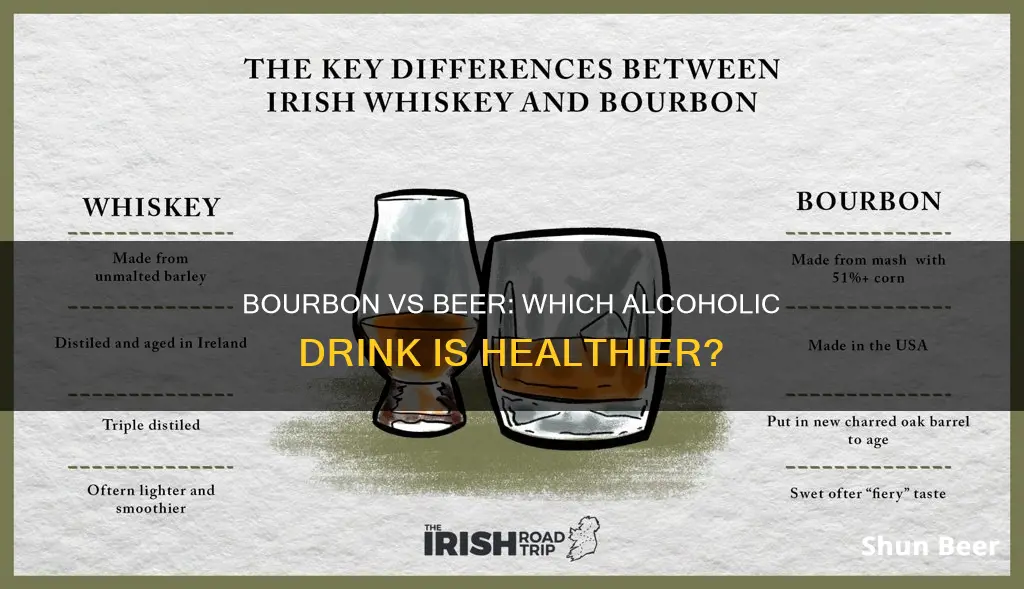
Alcohol consumption is a complex topic when it comes to health, and while there may be some benefits to moderate drinking, excessive alcohol use is linked to various health issues. Beer and bourbon (a type of whiskey) are popular alcoholic beverages, and comparing their health impacts involves considering factors such as calorie content, carbohydrate levels, and the presence of antioxidants. Beer, for instance, tends to be high in calories and carbohydrates, contributing to weight gain, while bourbon, as a distilled spirit, typically contains fewer calories and no carbohydrates. On the other hand, beer has more antioxidants than bourbon due to its barley malt and hops content. Ultimately, the key to minimising health risks associated with alcohol consumption lies in moderation, regardless of the type of beverage.
Bourbon vs Beer
| Characteristics | Values |
|---|---|
| Calories | Bourbon has fewer calories than beer. A shot of bourbon has around 96-105 calories, while a 12-ounce beer has around 150 calories. |
| Carbohydrates | Bourbon has fewer or no carbohydrates, while beer is often carbohydrate-rich. |
| Antioxidants | Beer has more antioxidants than bourbon, but the overall effect is small. |
| Health Benefits | Both beer and bourbon have similar health benefits, including a reduced risk of heart disease. However, excessive alcohol consumption is associated with an increased risk of certain cancers and other health issues. |
| Weight Gain | Both beer and bourbon can contribute to weight gain due to their calorie content. However, beer may be more likely to lead to weight gain due to its higher calorie and carbohydrate content. |
| Popularity | Beer is the preferred alcoholic beverage in the United States, with 42% of Americans choosing it over liquor (19%) and wine. |
What You'll Learn

Bourbon and Scotch are tied for 5th healthiest hard liquors
It is important to note that excessive alcohol consumption can cause serious health issues, and there are many factors to consider when comparing the health benefits of different alcoholic drinks. That being said, when it comes to the healthiest hard liquors, bourbon and scotch are tied for fifth place.
Hard liquors, also known as distilled spirits, are produced by carefully boiling and condensing grains, fruit, or vegetables that have already been fermented. This process purifies the liquid and removes water, resulting in a higher proportion of alcohol content compared to beers and wines, which are not distilled.
While beer has more antioxidants than hard liquor, the overall effect is small. One advantage of hard liquor is that many spirits, including vodka, rum, whiskey, gin, and tequila, have zero carbohydrates. This can be beneficial for individuals trying to keep their blood sugar levels stable. However, when hard liquor is combined with sugary mixers, the calorie count and carbohydrate content increase significantly.
When it comes to calories, a standard 12-ounce serving of 5% ABV beer typically contains around 150 calories. In comparison, a shot of liquor (1.5 ounces) usually has fewer calories, ranging from 63 calories for tequila to 96-98 calories for vodka.
Scotch and bourbon are tied for fifth place in terms of health benefits among hard liquors. Both of these whiskeys contain a significant amount of antioxidants, similar to the levels found in wine. The aging process in wooden barrels also creates ellagic acid, which helps regulate blood sugar levels and has anti-cancer properties. However, bourbon is made with at least 51% corn, and genetically modified corn is widely used in the United States, so it may be less desirable for health-conscious consumers. To maximize the health benefits of whiskey, opt for single malt varieties, as they contain more antioxidants and ellagic acid than blended whiskeys.
Beer and Health: Is NA Beer a Healthy Alternative?
You may want to see also

Beer has more antioxidants than bourbon
Bourbon, on the other hand, is a type of whiskey that also contains antioxidants. Whiskey contains high levels of ellagic acid, an antioxidant compound that helps neutralize free radicals, the harmful by-products of cellular metabolism that cause diseases such as cancer and heart disease. However, the amount of antioxidants in bourbon is lower than that of beer.
The antioxidants in beer and bourbon provide several health benefits. The antioxidants in beer have been shown to improve certain diseases, such as increasing bone density, providing cardiovascular and immunological benefits, and exhibiting anti-inflammatory and antioxidant properties. The antioxidants in bourbon can aid in weight loss, prevent cancer, and regulate diabetes.
In summary, while both beer and bourbon contain antioxidants that offer health benefits, beer has a higher content of antioxidants due to the presence of polyphenols and melanoidins, which are formed during the brewing process.
Hard Seltzer vs Beer: Which Drink is Healthier?
You may want to see also

Bourbon has more calories than beer
While it may be true that bourbon has fewer calories than beer, it is important to remember that alcohol should always be consumed in moderation. This is because drinking in excess is very unhealthy, whether for your liver or your waistline.
Calories in Alcohol
Each gram of alcohol contains 7 calories. Alcoholic drinks also tend to be carbohydrate-rich, which can contribute to weight gain. The amount of calories in an alcoholic beverage can vary depending on its other ingredients. For example, mixers such as juice or soda can add to the overall calorie count.
Calories in Beer
The number of calories in beer can vary depending on the type and brand. However, a standard 12-ounce serving of 5% ABV beer usually contains around 150 calories. Low-calorie beers are also available, which can have as few as 55 calories per beer.
Calories in Bourbon
A 1.5-ounce shot of bourbon typically contains around 97 calories and 0 grams of carbohydrates. However, it is important to note that this calorie count can increase if the bourbon is mixed with sodas or other sugary mixers.
Tips for Drinking in Moderation
If you are looking to make the switch from beer to bourbon, here are a few tips to keep in mind:
- Sip and savor your drink. Spirits have a higher alcohol content than beer, so it is important to pace yourself.
- Be mindful of how much you are drinking. Drinking in moderation is not correlated with weight gain, while heavy drinking is.
- Choose clear spirits whenever possible, as they have the least impact on your metabolism.
- Avoid flavored liquors, as they often contain added sugars.
Beer for Hair: Healthy Shine or Foamy Disaster?
You may want to see also

Bourbon has fewer carbohydrates than beer
Bourbon, a type of whiskey, is a distilled spirit typically made from a combination of grains, including corn, rye, barley, and sometimes wheat. The distillation process of bourbon involves converting carbohydrates from the grains into alcohol, effectively removing any residual carbohydrates from the final product. As a result, bourbon is a suitable choice for individuals following a low-carb or keto diet.
Beer, on the other hand, is an alcoholic beverage that can be made from various grains, such as barley, wheat, or rice. It undergoes a different fermentation process than bourbon, resulting in a higher carbohydrate content. The specific carbohydrate count in beer can vary depending on the type and brand, but it typically ranges from 10 to 20 grams of carbs per 12-ounce serving.
When comparing bourbon and beer, it is important to consider their overall nutritional profiles. While bourbon has fewer carbohydrates, it still contains a significant number of calories. Additionally, both beverages can have negative health consequences if consumed in excess. Therefore, moderation is essential when it comes to alcohol consumption.
In summary, bourbon has fewer carbohydrates than beer due to its distillation process, making it a preferred choice for those watching their carbohydrate intake or following specific diets such as keto or low-carb. However, it is important to consume bourbon in moderation and be mindful of any mixers or additives that may increase the overall calorie and carbohydrate content.
Mead vs Beer: Which Is Healthier?
You may want to see also

Bourbon is healthier than beer for people with diabetes
Drinking alcohol can affect blood sugar levels, interact with diabetes medications, and contribute to complications. However, drinking a moderate amount of certain alcoholic beverages, such as red wine, is generally considered safer for people with diabetes.
Diabetes is characterised by lower-than-normal insulin production or function, which is the hormone that controls blood sugar levels. Therefore, blood sugar management is crucial for people with diabetes. Alcohol consumption can cause blood sugar levels to rise or fall, depending on the drink and whether food has been consumed recently.
For people with diabetes, studies suggest that moderate alcohol consumption, particularly of red wine, is associated with health benefits. On the other hand, heavy drinking may interfere with medications and increase the risk of diabetes-related complications. According to the 2020-2025 Dietary Guidelines for Americans, moderate alcohol consumption is defined as up to one drink per day for women and up to two drinks per day for men.
When it comes to choosing an alcoholic beverage, low-carb beers or distilled spirits are generally recommended for people with diabetes. A standard 12-ounce beer typically contains about 15 grams of carbohydrates, while light beers have 3 to 6 grams. Low-carb beers can have up to 37% fewer calories and 80% fewer carbs than regular beers.
Distilled spirits or hard liquors, such as gin, rum, vodka, or whiskey, contain few to no carbohydrates. However, it is important to be aware of the risk of hypoglycemia when consuming these beverages. This can occur because the liver cannot maintain basal blood sugar levels while metabolising alcohol, leading to very low blood sugar levels, especially if consumed on an empty stomach.
In summary, for people with diabetes, bourbon is likely to be a healthier choice than beer due to its lower carbohydrate content and lower risk of blood sugar spikes. However, it is important to remember that alcohol itself can interfere with blood sugar management, so drinking in moderation and following recommended practices for people with diabetes is crucial.
Hard Seltzer vs Beer: Which is the Healthier Choice?
You may want to see also







